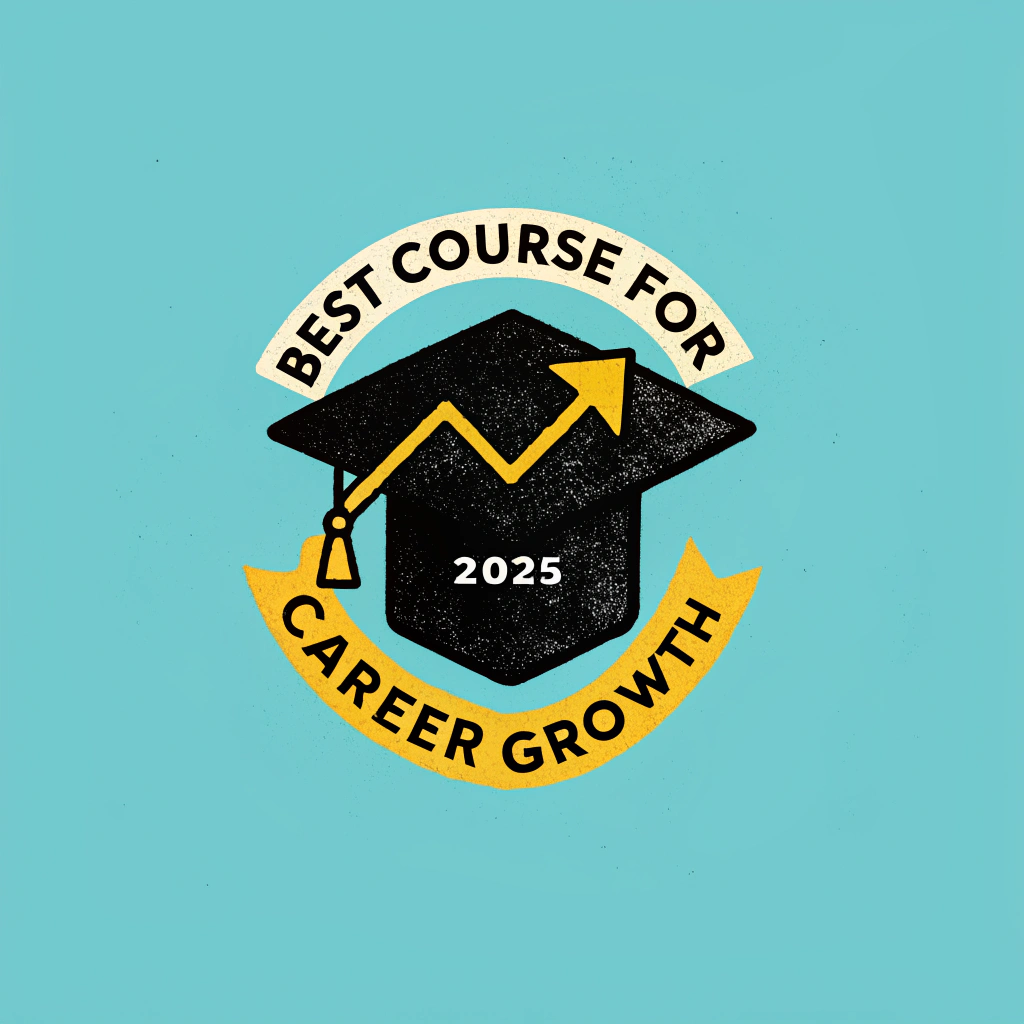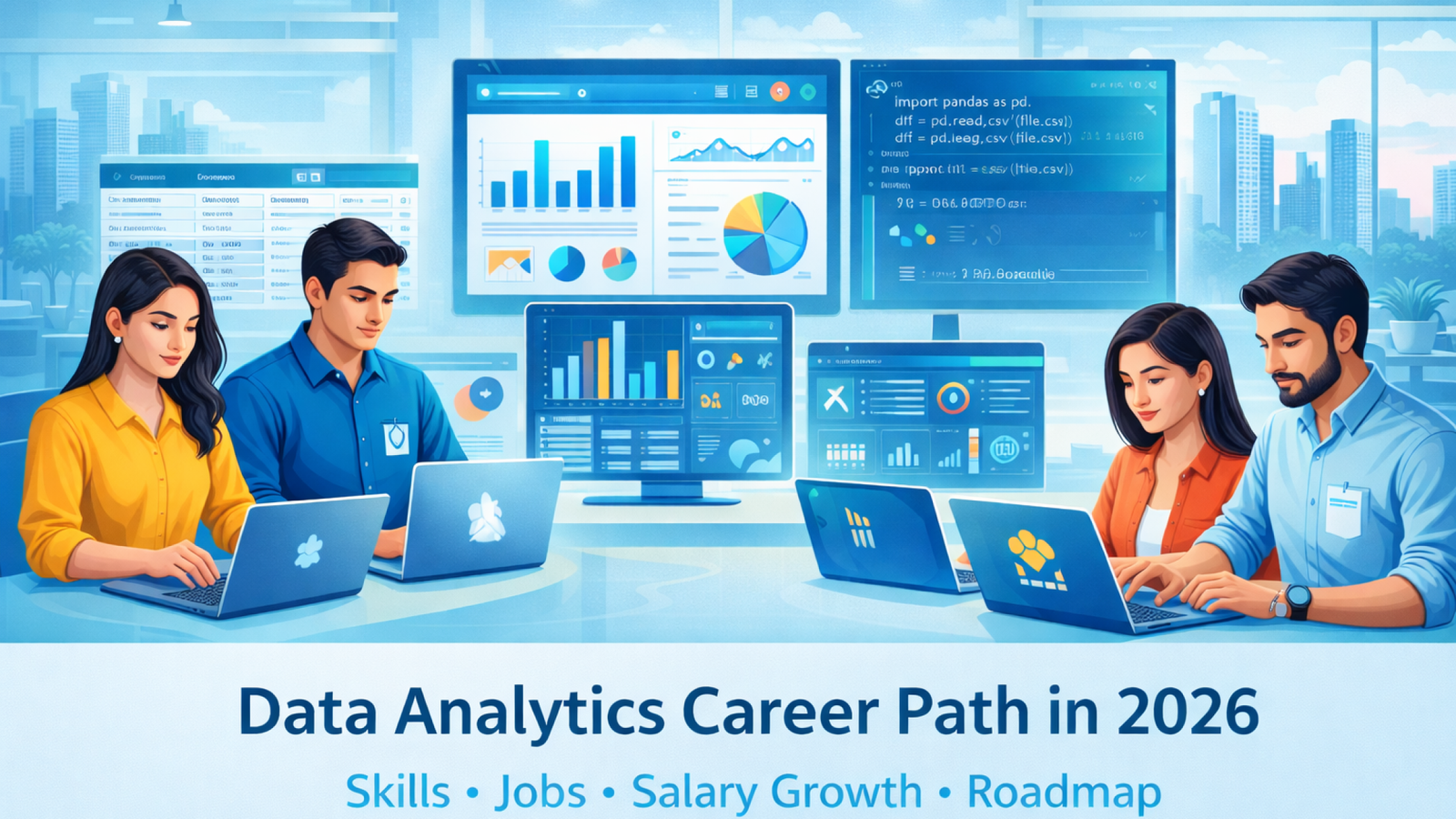How to Choose the Best Course for Career Growth | 2025-2026

INTRODUCTION
How to Choose the Best Course for Career Growth? The world of work is evolving faster than ever. New technologies, changing job roles, and growing competition are pushing students and professionals to constantly upgrade their skills. In this environment, one of the most powerful decisions you can make for your future is choosing the right course for career growth.
But here’s the truth: the sheer number of options available today can be overwhelming. From short-term certifications to online bootcamps, from professional diplomas to specialized degree programs—the choices are endless. And not every course will give you the return on investment you’re looking for.
Think of it this way: your career is like a ladder, and every new course you take is a step upward. If you choose wisely, you climb higher, gain new opportunities, and position yourself ahead of others. But if you choose a course that doesn’t match your goals, you may feel stuck, frustrated, or even waste precious time and money.
That’s why it’s not just about learning something new—it’s about learning the right thing at the right time. The right course can help you:
Build in-demand skills that employers value.
Switch to a new career field with confidence.
Earn higher salaries and promotions.
Stay relevant in industries that are rapidly changing.
For instance:
A student fresh out of school might find that a digital marketing course opens doors to freelancing and global opportunities.
A software developer who upskills in AI, machine learning, or cloud computing can double their career prospects.
A working professional who learns leadership, data analytics, or project management can fast-track into senior roles.
In short, the course you choose can shape the trajectory of your entire career. This blog will guide you step by step on how to make that decision wisely—so you don’t just learn, but you grow, succeed, and stay ahead in your professional journey.
 Factors to Consider Before Choosing the Best Course for Career Growth
Factors to Consider Before Choosing the Best Course for Career Growth
Choosing the right course is not a random decision—it’s a strategic move that can define your career path for years. Before you invest your time, money, and energy, it’s important to consider a few key factors that will help you identify the best course for career growth.
1. Identify Your Career Goals
The first step is to get absolute clarity on what you want from your career. Are you looking to switch industries? Do you want to specialize in your current field? Or are you trying to build a skill set that can make you stand out for promotions?
For example:
If you’re a student planning to enter the job market, a course with job-ready skills and internships might be best.
If you’re a working professional, a specialization course that aligns with your industry trends could give you an edge.
Always ask yourself: Where do I want to be in the next 3–5 years? The course should take you closer to that vision.
2. Research Industry Demand
A course is only valuable if it aligns with current and future industry demand. Spending months learning something outdated will not help your career.
Check job portals like LinkedIn or Naukri to see what skills employers are hiring for.
Follow industry reports from platforms like Gartner, McKinsey, or Coursera to know which fields are growing.
Look at emerging technologies such as AI, cloud computing, digital marketing, and data analytics—these fields are driving most industries forward.
By matching your course with market demand, you’ll ensure that the skills you learn are actually useful in landing better opportunities.
3. Course Curriculum & Content
Not all courses are designed equally. Some focus on theory, while others offer hands-on training and real-world projects. When choosing the best course for career growth, carefully analyze:
Course modules – Are they updated with the latest tools, technologies, and industry practices?
Practical training – Does it include case studies, assignments, or live projects?
Duration – Is it short-term for quick skill building or long-term for deep expertise?
Example: A digital marketing course that teaches SEO, social media, and paid ads with live campaign practice is far more valuable than a course with only textbook theory.
4. Accreditation & Certification
Employers value verified and globally recognized certifications. Before enrolling, check:
Is the course provided by a reputed institution or learning platform?
Will you get a certificate that is recognized by companies worldwide?
Is the course partnered with organizations like Google, Microsoft, or HubSpot?
Having a certificate from a well-known body can instantly strengthen your CV and help you stand out.
5. Mode of Learning (Online vs Offline)
With today’s flexibility, you can choose between online learning, offline classes, or hybrid models.
Online courses: Perfect for working professionals or those who prefer learning at their own pace.
Offline/bootcamps: Great for students who want direct mentorship, group projects, and networking.
Hybrid: A balance of both, offering flexibility plus hands-on support.
Choose what matches your schedule, learning style, and personal discipline.
6. Budget and ROI (Return on Investment)
A costly course does not always guarantee success. The best course is the one that provides maximum ROI—meaning the value you gain is worth more than what you invest.
Ask yourself:
Does this course lead to better job opportunities or higher salaries?
Will the skills I gain open doors to freelancing or side hustles?
Are there financing or installment options available?
Sometimes, a mid-range course with strong practical training can offer more value than a highly expensive one.
7. Placement Assistance & Career Support
One of the strongest indicators of a good course is whether it provides placement support. Many institutes now offer:
Resume building and LinkedIn profile optimization.
Mock interviews and career counseling.
Direct job placement with industry partners.
If your goal is to secure a job quickly, this factor is crucial in making the right choice.
Pro Tip: Never choose a course just because it’s “popular.” Choose it because it aligns with your goals, has high market demand, and offers long-term benefits.
 Popular Courses for Career Growth in 2025–2026
Popular Courses for Career Growth in 2025–2026
The job market is evolving faster than ever. With automation, AI, and digital transformation, industries are demanding new-age skills. Choosing the best course for career growth depends on aligning yourself with these trends. Below are some of the most in-demand courses in 2025–2026 that can help you future-proof your career.
1. Digital Marketing
In today’s business world, every company needs a strong online presence. Digital marketing has become one of the most lucrative career paths, offering opportunities across industries.
Why Choose Digital Marketing?
Every business, from startups to global enterprises, needs marketing experts.
Demand is high, and the industry is recession-proof.
You can work as a freelancer, consultant, or even start your own agency.
Key Skills You’ll Learn:
Search Engine Optimization (SEO)
Social Media Marketing (SMM)
Pay-Per-Click (PPC) Ads
Content Marketing
Email & Automation Tools
Analytics & Conversion Tracking
Digital marketing courses with global certifications from Google, HubSpot, or Meta add huge credibility to your resume.
2. Artificial Intelligence (AI) & Machine Learning (ML)
AI is not just the future—it’s the present. From chatbots to predictive analytics, AI is transforming industries like healthcare, finance, e-commerce, and IT.
Why Choose AI & ML?
High salaries and career growth potential.
Skills are transferable across multiple industries.
Governments and enterprises worldwide are investing in AI adoption.
Key Skills You’ll Learn:
Python & R programming
Neural Networks & Deep Learning
Natural Language Processing (NLP)
Data Visualization & Analysis
AI tools like TensorFlow, PyTorch
Careers include AI Engineer, Data Scientist, ML Specialist, and AI Researcher.
3. Data Science & Analytics
Data is the new oil, and companies rely on data-driven decisions to grow. With every business collecting massive amounts of data, professionals skilled in data analytics are highly sought after.
Why Choose Data Science?
Ranked among the highest-paying careers globally.
Growing demand in banking, retail, healthcare, and IT.
Can work in both corporate roles and freelancing projects.
Key Skills You’ll Learn:
Data Cleaning & Processing
SQL, Python, R
Statistical Analysis
Predictive Modeling
Big Data Tools (Hadoop, Spark)
A Data Science course with global certification can open doors to roles like Data Analyst, Data Scientist, or Business Intelligence Manager.
4. Cloud Computing & Cybersecurity
With most companies moving to cloud platforms like AWS, Azure, and Google Cloud, cloud engineers are in huge demand. At the same time, cybersecurity experts are needed to protect digital infrastructures.
Why Choose Cloud & Cybersecurity?
Cloud adoption is growing exponentially across industries.
Cybersecurity threats are increasing—companies need specialists.
High job stability and global career opportunities.
Key Skills You’ll Learn:
Cloud platforms (AWS, Azure, GCP)
Network Security & Ethical Hacking
Penetration Testing
Identity & Access Management
Cloud Deployment & Security Tools
Career roles include Cloud Engineer, Cybersecurity Analyst, and IT Security Consultant.
5. Business Management & Leadership Courses (MBA, Executive Programs)
For those aiming at leadership roles, business management courses still hold great value. With the right specialization, you can combine management + technical skills for maximum career growth.
Why Choose Business Management?
Helps you grow into managerial and leadership positions.
Strong ROI in corporate environments.
Enhances decision-making and problem-solving abilities.
Popular Specializations:
Marketing & Sales
Finance & Accounting
Human Resource Management
Operations & Supply Chain
IT & Digital Transformation
Programs like an MBA or Executive MBA (online or offline) are great for professionals aiming at senior positions.
6. UI/UX Design & Creative Courses
With the explosion of apps, websites, and digital platforms, UI/UX designers are in demand to create user-friendly digital experiences.
Why Choose UI/UX?
Combines creativity with technology.
High demand in IT, e-commerce, gaming, and app development.
Flexible career opportunities including freelancing.
Key Skills You’ll Learn:
User Research & Journey Mapping
Wireframing & Prototyping (Figma, Adobe XD)
Graphic Design Principles
Usability Testing
Front-End Basics (HTML, CSS)
Careers include UI/UX Designer, Product Designer, and Interaction Specialist.
7. Specialized Career-Oriented Short Courses
Apart from mainstream courses, short-term certifications can also boost career growth:
Project Management (PMP, PRINCE2, Agile)
Finance & Accounting (CFA, CPA, Financial Modeling)
Language Skills (English, Business Communication, Foreign Languages)
Soft Skills (Public Speaking, Negotiation, Leadership)
These certifications might be shorter in duration but can give your resume a competitive advantage.
Conclusion:
There is no “one-size-fits-all” answer. The best course for career growth depends on your interests, career goals, and industry demand. Whether you want to enter the tech world with AI, build a creative career with design, or climb the corporate ladder with management, the opportunities are limitless in 2025–2026.
How to Select the Best Course for Your Career Growth (Step-by-Step Guide)
Choosing a career-focused course isn’t just about what’s trending—it’s about what fits your goals, interests, and strengths. Many students and professionals make the mistake of blindly following what everyone else is doing, only to realize later that it doesn’t align with their personality or career goals.
Here’s a step-by-step guide to help you pick the right course for long-term success:
Step 1: Identify Your Career Goals
Ask yourself:
Do I want a high-paying job immediately?
Am I aiming for a long-term leadership role?
Do I want to work abroad or stay in my country?
Am I looking for a creative role or a technical one?
For example, if you want a fast-growing career in technology, AI or Data Science might be your best choice. If you love creativity and flexibility, Digital Marketing or UI/UX could be perfect.
Step 2: Analyze Your Interests & Strengths
Your course should align with what you enjoy doing, otherwise, you’ll lose motivation quickly.
If you’re good with numbers → Data Science, Finance, Analytics
If you’re creative → Digital Marketing, Graphic Design, UI/UX
If you’re analytical & problem-solving → AI, Cybersecurity, Cloud Computing
If you’re a people-person → Business Management, HR, Communication Courses
Remember: Career growth is fastest when passion meets skill.
Step 3: Research Industry Demand
Before enrolling in any course, check:
Is the skill in demand right now and in the future?
What are the average salaries worldwide and in your country?
Do companies actively hire for this role?
Example: While traditional jobs are shrinking, digital-first careers (AI, Data Science, Digital Marketing, Cybersecurity) are growing exponentially.
Step 4: Check the Course Curriculum & Certifications
Not all courses are equal. A good course should:
Be updated with the latest tools & technologies
Offer hands-on training & projects
Provide industry-recognized certifications (Google, AWS, HubSpot, Microsoft, etc.)
Have placement assistance or strong alumni connections
Tip: Always check reviews and testimonials before enrolling.
Step 5: Consider Duration & Flexibility
Some courses are short-term (3–6 months), while others take 2–3 years. Depending on your career goals, pick wisely:
If you need quick skills for jobs, go for short-term certifications.
If you want long-term academic credibility, consider degrees/diplomas.
If you’re working, look for online & self-paced courses.
Step 6: Evaluate ROI (Return on Investment)
Before investing your money and time, ask:
How much will this course cost me?
What kind of salary or job roles can I expect after completing it?
Will this skill still be relevant in 5–10 years?
Example: A course in Digital Marketing or Data Science may pay back your investment within 6–12 months of working.
Step 7: Network & Seek Guidance
Talk to:
Industry professionals
Alumni who completed the course
Career counselors or mentors
Real-world advice can help you avoid wrong choices and focus on courses with genuine value.
Step 8: Think Globally, Act Locally
Many global certifications are recognized worldwide and can open up international opportunities. For example:
Google/HubSpot (Digital Marketing)
AWS/Azure (Cloud Computing)
CFA/CPA (Finance)
PMP (Project Management)
Pick a course that is valid both in your local job market and internationally if you plan to work abroad.
Conclusion:
Choosing the best course for career growth requires a mix of self-awareness + industry research + future planning. If you align your interests, strengths, and career goals with the right course, you’ll not only secure a high-paying job but also enjoy long-term satisfaction.
Future Career Trends & Courses That Will Dominate 2025–2030
The world of work is changing faster than ever before. New technologies, digital transformation, and global connectivity are reshaping how we live, learn, and work. If you are thinking about choosing the best course for career growth, it’s not enough to only look at what’s relevant today—you need to look ahead and prepare for the skills of tomorrow.
In this section, we’ll explore the top career fields and courses that will dominate the next 5–10 years, along with why they matter, what skills you’ll need, and how you can prepare for them.
1. Artificial Intelligence (AI) & Machine Learning (ML)
AI is no longer science fiction—it’s the backbone of everything from chatbots and recommendation systems to autonomous vehicles and healthcare innovations.
Why It Matters:
Businesses are investing heavily in AI to improve efficiency and customer experience.
AI-related jobs are among the highest-paying globally.
By 2030, AI is expected to contribute over $15 trillion to the global economy.
Career Opportunities:
AI Engineer
Machine Learning Specialist
AI Researcher
Robotics Engineer
NLP (Natural Language Processing) Expert
Recommended Courses:
AI & ML Certifications (Coursera, edX, Cambridge Infotech Bootcamps, etc.)
Deep Learning & Neural Networks Training
Python, TensorFlow, PyTorch, R programming
2. Data Science & Big Data Analytics
In the digital age, data is the new oil. Every company, from startups to tech giants, depends on data-driven decision-making.
Why It Matters:
Demand for data scientists has skyrocketed worldwide.
Organizations use data to understand customer behavior, forecast trends, and make business strategies.
Career Opportunities:
Data Scientist
Business Intelligence Analyst
Data Engineer
Big Data Architect
Recommended Courses:
Data Science Bootcamps with global certifications
Big Data Analytics (Hadoop, Spark, SQL)
Advanced Statistics, Python, R, Excel, Tableau, Power BI
 3. Digital Marketing & E-Commerce
3. Digital Marketing & E-Commerce
As businesses go digital, the need for skilled digital marketers has exploded. From SEO to social media ads, companies want experts who can grow their brand online.
Why It Matters:
Every company—tech, retail, healthcare, education—needs a strong online presence.
E-commerce sales are expected to reach $8 trillion by 2030.
Career Opportunities:
Digital Marketing Specialist
SEO/SEM Expert
Social Media Manager
Content Marketer
Paid Ads Specialist
E-commerce Growth Manager
Recommended Courses:
Global Digital Marketing Certification Programs (Google, HubSpot, Facebook Blueprint)
E-commerce Marketing Strategies
SEO, Content Marketing, Analytics & Automation tools
4. Cybersecurity
With the rise of cyber threats, cybersecurity has become one of the most critical fields worldwide.
Why It Matters:
Cybercrime damages are expected to reach $10.5 trillion annually by 2025.
Every business—small or large—needs cybersecurity experts to protect data.
Career Opportunities:
Cybersecurity Analyst
Ethical Hacker / Penetration Tester
Information Security Manager
Cloud Security Engineer
Recommended Courses:
Certified Ethical Hacker (CEH)
CompTIA Security+
CISSP (Certified Information Systems Security Professional)
Cloud Security Certifications (AWS, Microsoft, Google Cloud)
5. Cloud Computing & DevOps
As businesses shift online, cloud computing has become the foundation of IT infrastructure.
Why It Matters:
Over 90% of companies worldwide are moving to cloud platforms.
Cloud experts are highly in demand for managing storage, security, and scalability.
Career Opportunities:
Cloud Architect
Cloud Engineer
DevOps Specialist
Site Reliability Engineer
Recommended Courses:
AWS Certified Solutions Architect
Microsoft Azure & Google Cloud Certifications
DevOps Tools: Docker, Kubernetes, Jenkins, Terraform
6. Healthcare & Biotechnology Careers
The COVID-19 pandemic proved how vital healthcare innovation is. With new technologies like genomics, telemedicine, and AI in healthcare, opportunities are booming.
Why It Matters:
Biotechnology and healthcare jobs are among the most future-proof careers.
Advances in AI-driven healthcare and personalized medicine are shaping the industry.
Career Opportunities:
Healthcare Data Analyst
Biomedical Engineer
Biotech Researcher
Public Health Specialist
Recommended Courses:
Bioinformatics & Biotechnology Training
Healthcare Analytics
Clinical Data Management Courses
7. Green Energy & Sustainability
The world is shifting towards renewable energy and eco-friendly practices. Climate change awareness is creating millions of jobs in this sector.
Why It Matters:
Green jobs are expected to grow massively as governments push for net-zero emissions.
Careers in energy management and sustainability are future-proof.
Career Opportunities:
Renewable Energy Engineer
Sustainability Consultant
Environmental Analyst
Solar & Wind Power Technician
Recommended Courses:
Renewable Energy Management Programs
Environmental Science & Policy
Carbon Accounting Certifications
8. Creative & Design Careers
While technology dominates, creativity still has a huge role in future careers. AI can generate art, but it still needs human vision and strategy.
Why It Matters:
Brands and businesses rely on visual storytelling and design.
The creator economy (YouTubers, influencers, freelancers) is projected to be a $500 billion industry by 2030.
Career Opportunities:
UI/UX Designer
Graphic Designer
Video Editor
3D Animator
AR/VR Designer
Recommended Courses:
Adobe Creative Suite Mastery
UI/UX Certification Programs
AR/VR Design Training
9. Finance, FinTech & Blockchain
Money is going digital. Cryptocurrencies, blockchain, and online payments are reshaping the financial sector.
Why It Matters:
Blockchain is not just about crypto—it’s about security, transparency, and innovation in finance.
FinTech is expected to dominate banking and global transactions.
Career Opportunities:
Blockchain Developer
FinTech Analyst
Financial Data Scientist
Cryptocurrency Expert
Recommended Courses:
Blockchain Development (Ethereum, Solidity)
FinTech Innovation Programs
Cryptocurrency Trading & Investment
10. Soft Skills & Leadership Development
No matter how advanced technology gets, human skills will never go out of style. Companies need leaders who can manage teams, solve problems, and think critically.
Why It Matters:
Automation may replace repetitive jobs, but leadership, creativity, and problem-solving will always be valuable.
Soft skills often decide promotions and leadership positions.
Career Opportunities:
Project Manager
HR Manager
Business Consultant
Leadership Trainer
Recommended Courses:
Communication & Public Speaking
Emotional Intelligence Training
Project Management Professional (PMP)
Business Strategy Programs
Conclusion:
The future of careers between 2025 and 2030 will be shaped by AI, data, digital transformation, sustainability, and creativity. The key is to future-proof yourself by learning skills that are both in demand today and will stay relevant tomorrow.
Instead of chasing random courses, focus on future-driven, globally recognized programs that open career doors worldwide.
If you’re a student or working professional reading this, the smartest move you can make is to invest in a career-focused course today—so you don’t just survive in the future, but lead it.
Frequently Asked Questions (FAQs)
1. How do I know which course is best for my career growth?
Start by identifying your career goals, strengths, and areas for improvement. Research industries in demand and match your skills with future opportunities.
2. Should I go for a short-term certification or a degree program?
It depends on your needs. Certifications are great for quick skill upgrades, while degree/diploma programs are better for long-term and structured learning.
3. How important is accreditation when choosing a course?
Very important! Accredited courses ensure recognition by employers, credibility in your resume, and often better job opportunities.
4. Can online courses help me grow in my career?
Absolutely. Many online courses now come with global certification and flexible learning, making them just as valuable as traditional classes.
5. What skills are most in-demand for career growth in 2026?
Some trending skills include digital marketing, AI & data science, cloud computing, cybersecurity, project management, and business analytics.
6. How do I balance my job while enrolling in a career-growth course?
Choose flexible learning formats like evening classes, weekend workshops, or self-paced online programs to balance both.
7. Are free courses useful for career growth?
Free courses are good for gaining basic knowledge, but paid, certified programs hold more value in the job market.
8. How do I avoid wasting money on irrelevant courses?
Always check the curriculum, trainer credibility, reviews, and career support services before enrolling in any course.
9. Will one course guarantee me a high-paying job?
Not instantly. A course enhances your skills and employability, but success also depends on networking, experience, and continuous learning.
10. How do I choose between multiple interests?
Prioritize based on long-term goals. Pick the field that aligns with your passion and has strong career demand. You can always add additional courses later.
Kickstart Your Career Growth Today!
If you’re a student looking to become a skilled professional, join our Career Growth Bootcamp. We offer online and offline classes, expert mentorship, and a Globally Verified Certification to make you job-ready. Don’t just study — build a career that grows with you! (Click here..)

 Popular Courses for Career Growth in 2025–2026
Popular Courses for Career Growth in 2025–2026





